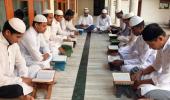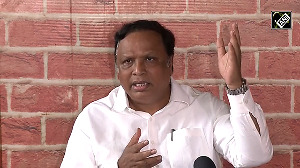Observing secularism means to 'live and let live', the Supreme Court on Tuesday said regulating madrasas was in the national interest as several hundred years of the nation's composite culture could not be wished away by creating silos for minorities.

The observations came from a bench comprising Chief Justice of India (CJI) D Y Chandrachud and Justices J B Pardiwala and Manoj Misra during the day-long hearing on the pleas challenging the Allahabad high court judgement, which declared the 2004 Uttar Pradesh law on madrasas as unconstitutional saying it was violative of the principle of secularism.
"The judgement is reserved," the bench said at the completion of the arguments.
At the outset, the Uttar Pradesh government, in response to a query of the bench, said it stands by the Uttar Pradesh Board of Madarsa Education Act, 2004 and was of the view that the Allahabad high court should not have held the entire law as unconstitutional.
Agreeing to the submissions of senior lawyer Mukul Rohatgi, appearing for litigants opposed to the HC verdict, the CJI said, "Secularism means - live and let live."
Referring to the composite national culture, the CJI asked the state government, "Is it not in our national interest that you regulate the madrasas?"
"You cannot wish away several hundred years of history of this nation like this. Suppose, we uphold the high court order and the parents of the children still send them to madrasas then it will just be a silo without any legislative intervention mainstreaming is the answer to ghettoisation," the bench said.
It said let us preserve India as a melting pot of cultures and religions.
"Ultimately we have to see it through the broad sweep of the country. Religious instructions are there not just for Muslims. It is there for Hindus, Sikhs, Christians, etc. The country ought to be a melting pot of cultures, civilisations, and religions. Let us preserve it that way. In fact, the answer to ghettoisation is to allow people to come to the mainstream and to allow them to come together. Otherwise, what we essentially would be doing is to keep them in silos," the CJI said.
The bench said Article 28(3) of the Constitution provides that a student can voluntarily obtain religious instructions with the only bar there should be no compulsion.
It asked as to what was wrong with the law recognising madrasas imparting religious instructions and mandating they should follow certain basic standards and striking down the entire law meant such institutions would remain unregulated.
The bench highlighted that imparting religious instructions was not limited to Muslims only and said if there was an institute training Buddhist monks, could the state ask it to provide some secular education also.
"This is the ethos of our country. Remember, what you are arguing in the context of Islam will apply across all religions in India right from Ved pathshalas to institutions training Buddhist monks, Jain priests, etc.," the CJI said.
The bench said it should not be misunderstood as it was equally concerned that the students of madrasas should also get quality education.
However, quashing the entire law was like throwing out the baby with the bathwater, it said, adding that religious instructions were never an anathema in the country.
Senior lawyer Guru Krishna Kumar said madrasa education would not enable students to be at par with the mainstream students.
"Why do you want them to be at par? You cannot compel them to be at par," the bench said.
Earlier in the day, the bench posed a specific query to Additional Solicitor General K M Natraj, appearing for the state government, on whether he stood by the validity of the law as it provided the authority to regulate madrasas as well.
"Are you standing by the validity of the Act," the CJI asked the law officer when he commenced his submissions on a batch of pleas against the high court verdict.
Natraj said, "I support the validity of the Act. Since, the constitutionality (of the law) has been struck down, we want to say something. We are defending the legislation. The state did not file a SLP (special leave petition)."
The state government filed its response in the high court standing by the Act and it cannot deviate from the stand, the law officer added.
The Uttar Pradesh Board of Madarsa Education Act, 2004 regulates the operation of madrasas in the state and was framed to ensure quality education, while adhering to constitutional principles, in such institutions.
On March 22, the Allahabad high court had declared the Act as 'unconstitutional' and violative of the principle of secularism, and asked the state government to accommodate madrasa students in the formal schooling system.
On April 5, the CJI-led bench had provided a breather to about 17 lakh madrasa students by staying the verdict of the high court scrapping the Uttar Pradesh Board of Madarsa Education Act, 2004.
The top court heard eight petitions, including the lead one filed by Anjum Kadari against the high court verdict.









